初中语法——现在完成时和过去完成时专题(可编辑修改word版)
- 格式:docx
- 大小:38.34 KB
- 文档页数:16
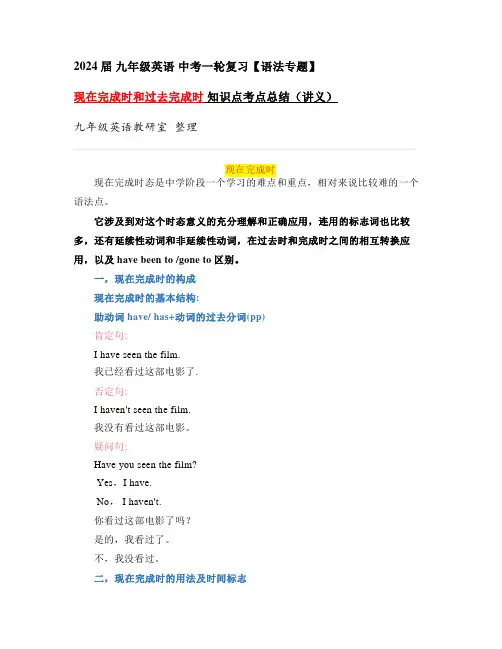
2024届九年级英语中考一轮复习【语法专题】现在完成时和过去完成时知识点考点总结(讲义)九年级英语教研室整理现在完成时现在完成时态是中学阶段一个学习的难点和重点,相对来说比较难的一个语法点。
它涉及到对这个时态意义的充分理解和正确应用,连用的标志词也比较多,还有延续性动词和非延续性动词,在过去时和完成时之间的相互转换应用,以及have been to /gone to区别。
一,现在完成时的构成现在完成时的基本结构:助动词have/ has+动词的过去分词(pp)肯定句:I have seen the film.我已经看过这部电影了.否定句:I haven't seen the film.我没有看过这部电影。
疑问句:Have you seen the film?Yes,I have.No, I haven't.你看过这部电影了吗?是的,我看过了。
不,我没看过。
二,现在完成时的用法及时间标志①表示过去发生的或已经完成的某一个动作,对现在造成的影响。
常用的时间标志有:already, just ,yet ,before, so far, recently,ever, never,until now,in the past five years等She has already cleaned her bedroom.她已经打扫过她的卧室了。
She hasn't cleaned her bedroom yet.她还没打扫她的卧室呢。
Have you decided yet?你已经决定了吗?注意: already常用在肯定句中,意为“已经”,yet用在一般疑问句和否定句末。
在一般疑问中,意为“已经”在否定句中,意为“还”。
She has just e back from Paris.她刚从巴黎回来。
She has written three books so far.到目前为止,她已经写了三本书了。
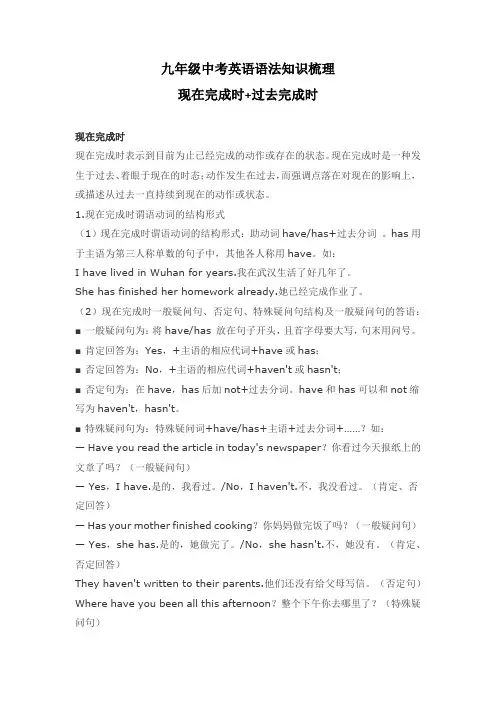
九年级中考英语语法知识梳理现在完成时+过去完成时现在完成时现在完成时表示到目前为止已经完成的动作或存在的状态。
现在完成时是一种发生于过去、着眼于现在的时态;动作发生在过去,而强调点落在对现在的影响上,或描述从过去一直持续到现在的动作或状态。
1.现在完成时谓语动词的结构形式(1)现在完成时谓语动词的结构形式:助动词have/has+过去分词。
has用于主语为第三人称单数的句子中,其他各人称用have。
如:I have lived in Wuhan for years.我在武汉生活了好几年了。
She has finished her homework already.她已经完成作业了。
(2)现在完成时一般疑问句、否定句、特殊疑问句结构及一般疑问句的答语:■一般疑问句为:将have/has 放在句子开头,且首字母要大写,句末用问号。
■肯定回答为:Yes,+主语的相应代词+have或has;■否定回答为:No,+主语的相应代词+haven't或hasn't;■否定句为:在have,has后加not+过去分词。
have和has可以和not缩写为haven't,hasn't。
■特殊疑问句为:特殊疑问词+have/has+主语+过去分词+……?如:— Have you read the article in today's newspaper?你看过今天报纸上的文章了吗?(一般疑问句)— Yes,I have.是的,我看过。
/No,I haven't.不,我没看过。
(肯定、否定回答)— Has your mother finished cooking?你妈妈做完饭了吗?(一般疑问句)— Yes,she has.是的,她做完了。
/No,she hasn't.不,她没有。
(肯定、否定回答)They haven't written to their parents.他们还没有给父母写信。
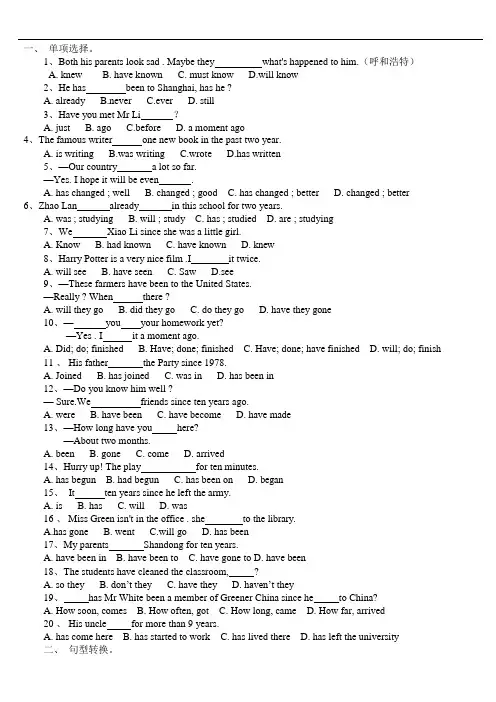
一、单项选择。
1、Both his parents look sad . Maybe they what's happened to him.(呼和浩特)A. knewB. have knownC. must knowD.will know2、He has been to Shanghai, has he ?A. alreadyB.neverC.everD. still3、Have you met Mr Li ?A. justB. agoC.beforeD. a moment ago4、The famous writer one new book in the past two year.A. is writingB.was writingC.wroteD.has written5、—Our country a lot so far.—Yes. I hope it will be even .A. has changed ; wellB. changed ; goodC. has changed ; betterD. changed ; better6、Zhao Lan already in this school for two years.A. was ; studyingB. will ; studyC. has ; studiedD. are ; studying7、We Xiao Li since she was a little girl.A. KnowB. had knownC. have knownD. knew8、Harry Potter is a very nice film .I it twice.A. will seeB. have seenC. SawD.see9、—These farmers have been to the United States.—Really ? When there ?A. will they goB. did they goC. do they goD. have they gone10、—you your homework yet?—Yes . I it a moment ago.A. Did; do; finishedB. Have; done; finishedC. Have; done; have finishedD. will; do; finish11 、His father the Party since 1978.A. JoinedB. has joinedC. was inD. has been in12、—Do you know him well ?— Sure.We friends since ten years ago.A. wereB. have beenC. have becomeD. have made13、—How long have you here?—About two months.A. beenB. goneC. comeD. arrived14、Hurry up! The play for ten minutes.A. has begunB. had begunC. has been onD. began15、It ten years since he left the army.A. isB. hasC. willD. was16 、Miss Green isn't in the office . she to the library.A.has goneB. wentC.will goD. has been17、My parents Shandong for ten years.A. have been inB. have been toC. have gone toD. have been18、The students have cleaned the classroom, ?A. so theyB. don’t theyC. have theyD. haven’t they19、has Mr White been a member of Greener China since he to China?A. How soon, comesB. How often, gotC. How long, cameD. How far, arrived20 、His uncle for more than 9 years.A. has come hereB. has started to workC. has lived thereD. has left the university二、句型转换。
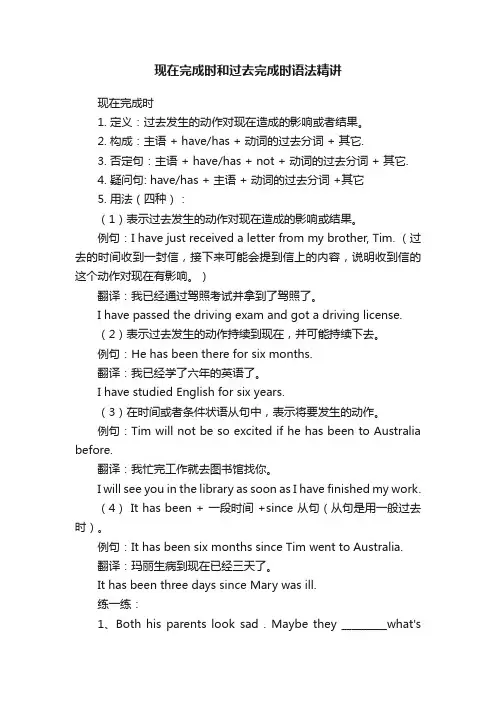
现在完成时和过去完成时语法精讲现在完成时1. 定义:过去发生的动作对现在造成的影响或者结果。
2. 构成:主语 + have/has + 动词的过去分词 + 其它.3. 否定句:主语 + have/has + not + 动词的过去分词 + 其它.4. 疑问句: have/has + 主语 + 动词的过去分词 +其它5. 用法(四种):(1)表示过去发生的动作对现在造成的影响或结果。
例句:I have just received a letter from my brother, Tim. (过去的时间收到一封信,接下来可能会提到信上的内容,说明收到信的这个动作对现在有影响。
)翻译:我已经通过驾照考试并拿到了驾照了。
I have passed the driving exam and got a driving license.(2)表示过去发生的动作持续到现在,并可能持续下去。
例句:He has been there for six months.翻译:我已经学了六年的英语了。
I have studied English for six years.(3)在时间或者条件状语从句中,表示将要发生的动作。
例句:Tim will not be so excited if he has been to Australia before.翻译:我忙完工作就去图书馆找你。
I will see you in the library as soon as I have finished my work.(4) It has been + 一段时间 +since 从句(从句是用一般过去时)。
例句:It has been six months since Tim went to Australia.翻译:玛丽生病到现在已经三天了。
It has been three days since Mary was ill.练一练:1、Both his parents look sad . Maybe they _________what'shappened to him .A. knew B. have known C. must know D.will know2、I_______ a letter from him since he left.(天津市)A.didn't receive B.haven't got C.didn't have D.haven't heard3、—Where have you _______ these days?—I have_____ to Dazhu with my friends.A.been;gone B.been;been C.gone;been D.gone;gone4、Have you met Mr Li ______?A. just B. ago C.before D. a moment ago5、His father ______ the Party since 1978 .A. joined B. has joined C. was in D. has been in6、My parents ______ Shandong for ten years .A. have been in B. have been toC. have gone to D. have been6. 现在完成时的标志(1)以already, just,ever,never和yet为标志Already表示“已经”。
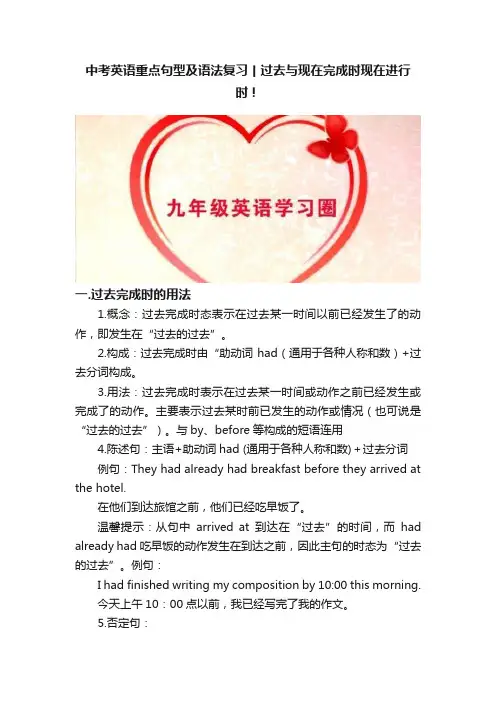
中考英语重点句型及语法复习丨过去与现在完成时现在进行时!一.过去完成时的用法1.概念:过去完成时态表示在过去某一时间以前已经发生了的动作,即发生在“过去的过去”。
2.构成:过去完成时由“助动词had(通用于各种人称和数)+过去分词构成。
3.用法:过去完成时表示在过去某一时间或动作之前已经发生或完成了的动作。
主要表示过去某时前已发生的动作或情况(也可说是“过去的过去”)。
与by、before等构成的短语连用4.陈述句:主语+助动词had (通用于各种人称和数)+过去分词例句:They had already had breakfast before they arrived at the hotel.在他们到达旅馆之前,他们已经吃早饭了。
温馨提示:从句中arrived at到达在“过去”的时间,而had already had吃早饭的动作发生在到达之前,因此主句的时态为“过去的过去”。
例句:I had finished writing my composition by 10:00 this morning.今天上午10:00点以前,我已经写完了我的作文。
5.否定句:主语+助动词had (通用于各种人称和数)+not+过去分词。
例句:He said that he had not seen such a beautiful bird before.他说他以前从来没有看过这样美丽的鸟。
6.疑问句助动词had (通用于各种人称和数)+主语+过去分词?例句:How many English flushed had you seen by the end of last term?到上学期期末为止,你们看了多少部英文片?Had you reached the station before ten o’clock?到十点以前,你们已经到达火车站了吗?温馨提示:如果时间状语从句的动作发生在前,则从句用过去完成时,主句用一般过去时。
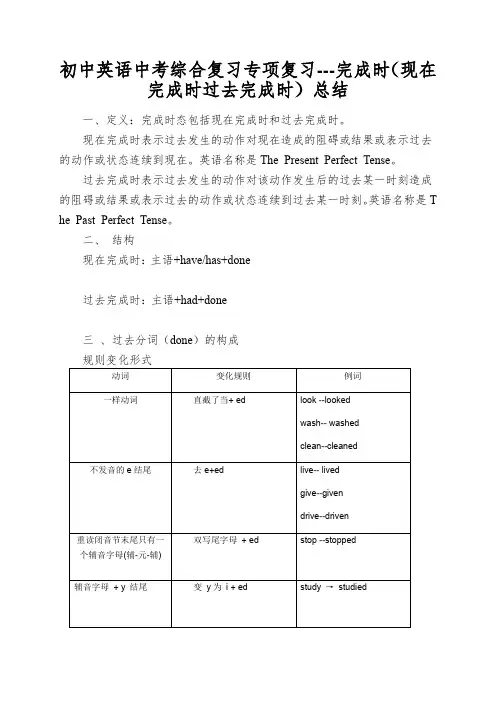
初中英语中考综合复习专项复习---完成时(现在完成时过去完成时)总结一、定义:完成时态包括现在完成时和过去完成时。
现在完成时表示过去发生的动作对现在造成的阻碍或结果或表示过去的动作或状态连续到现在。
英语名称是The Present Perfect Tense。
过去完成时表示过去发生的动作对该动作发生后的过去某一时刻造成的阻碍或结果或表示过去的动作或状态连续到过去某一时刻。
英语名称是T he Past Perfect Tense。
二、结构现在完成时:主语+have/has+done过去完成时:主语+had+done三、过去分词(done)的构成规则变化形式不规则变化形式四、时刻标志词现在完成时的时刻标志词【例句演练】1)All of their students have made rapid progress in the past few ye ars.2)I have lived here since twenty years ago.3)This is the most interesting news I have ever told.4)I haven't heard from my uncle for years.5)I have already written 10 books.6)We'll start at once if the rain has stopped.7)I have seen the movie twice.8)He has been to Beijing many times up to now.过去完成时的时刻标志词1) It was the third time that he had made the same mistake.He had taken the exam.I had been to America.They had visited a doctor.A thief had stolen my watch before I got home.It had rained heavily by last month.The students had gone before the teacher came.易错点当显现since+过去时刻点/ for +时刻段/ How long提问等3种情形时,主句中的谓语必须要是可连续动词的完成时。
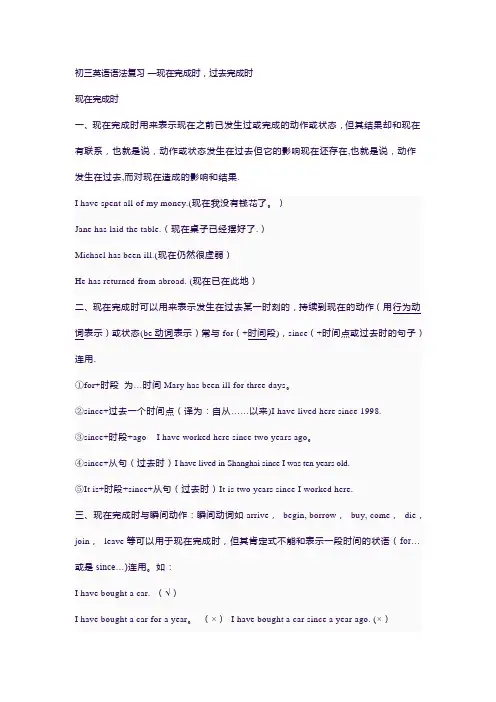
初三英语语法复习-—现在完成时,过去完成时现在完成时一、现在完成时用来表示现在之前已发生过或完成的动作或状态,但其结果却和现在有联系,也就是说,动作或状态发生在过去但它的影响现在还存在,也就是说,动作发生在过去,而对现在造成的影响和结果.I have spent all of my money.(现在我没有钱花了。
)Jane has laid the table.(现在桌子已经摆好了.)Michael has been ill.(现在仍然很虚弱)He has returned from abroad. (现在已在此地)二、现在完成时可以用来表示发生在过去某一时刻的,持续到现在的动作(用行为动词表示)或状态(be动词表示)常与for(+时间段),since(+时间点或过去时的句子)连用.①for+时段为…时间Mary has been ill for three days。
②since+过去一个时间点(译为:自从……以来)I have lived here since 1998.③since+时段+ago I have worked here since two years ago。
④since+从句(过去时)I have lived in Shanghai since I was ten years old.⑤It is+时段+since+从句(过去时)It is two years since I worked here.三、现在完成时与瞬间动作:瞬间动词如arrive,begin, borrow,buy, come,die,join,leave等可以用于现在完成时,但其肯定式不能和表示一段时间的状语(for…或是since…)连用。
如:I have bought a car. (√)I have bought a car for a year。
(×)I have bought a car since a year ago. (×)I have had a car for a year。
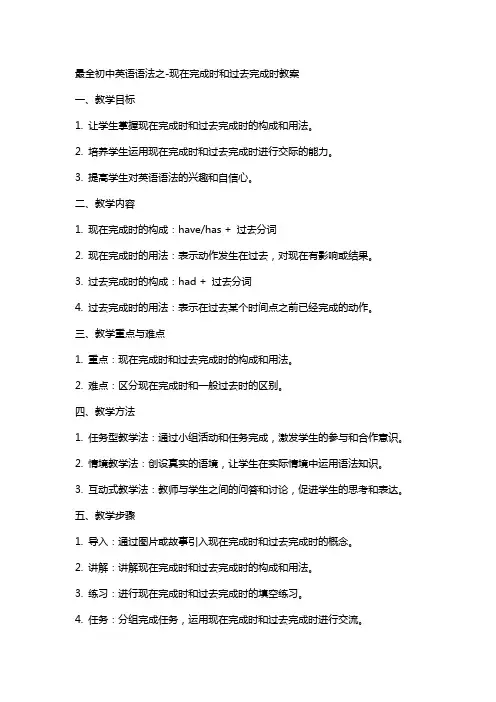
最全初中英语语法之-现在完成时和过去完成时教案一、教学目标1. 让学生掌握现在完成时和过去完成时的构成和用法。
2. 培养学生运用现在完成时和过去完成时进行交际的能力。
3. 提高学生对英语语法的兴趣和自信心。
二、教学内容1. 现在完成时的构成:have/has + 过去分词2. 现在完成时的用法:表示动作发生在过去,对现在有影响或结果。
3. 过去完成时的构成:had + 过去分词4. 过去完成时的用法:表示在过去某个时间点之前已经完成的动作。
三、教学重点与难点1. 重点:现在完成时和过去完成时的构成和用法。
2. 难点:区分现在完成时和一般过去时的区别。
四、教学方法1. 任务型教学法:通过小组活动和任务完成,激发学生的参与和合作意识。
2. 情境教学法:创设真实的语境,让学生在实际情境中运用语法知识。
3. 互动式教学法:教师与学生之间的问答和讨论,促进学生的思考和表达。
五、教学步骤1. 导入:通过图片或故事引入现在完成时和过去完成时的概念。
2. 讲解:讲解现在完成时和过去完成时的构成和用法。
3. 练习:进行现在完成时和过去完成时的填空练习。
4. 任务:分组完成任务,运用现在完成时和过去完成时进行交流。
5. 总结:归纳现在完成时和过去完成时的用法和区别。
六、课后作业1. 完成课后练习题,巩固现在完成时和过去完成时的知识。
2. 设计一个情境,与同学互相练习运用现在完成时和过去完成时进行交流。
七、教学评价1. 课堂参与度:观察学生在课堂上的发言和参与情况。
2. 练习完成情况:检查学生练习题的完成质量。
3. 情境交流:评估学生在情境中的语言运用能力和合作精神。
八、教学资源1. PPT:展示现在完成时和过去完成时的例句和练习。
2. 图片或故事:用于导入和创设情境。
3. 练习题:巩固学生对现在完成时和过去完成时的理解。
九、教学时间1课时(40分钟)十、教学拓展1. 对比现在完成时和一般过去时的用法,进行进一步的练习和讨论。
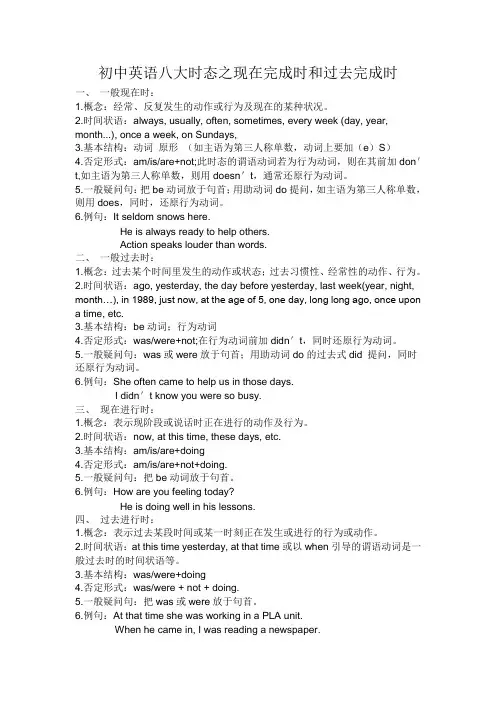
初中英语八大时态之现在完成时和过去完成时一、一般现在时:1.概念:经常、反复发生的动作或行为及现在的某种状况。
2.时间状语:always, usually, often, sometimes, every week (day, year, month...), once a week, on Sundays,3.基本结构:动词原形(如主语为第三人称单数,动词上要加(e)S)4.否定形式:am/is/are+not;此时态的谓语动词若为行为动词,则在其前加don't,如主语为第三人称单数,则用doesn't,通常还原行为动词。
5.一般疑问句:把be动词放于句首;用助动词do提问,如主语为第三人称单数,则用does,同时,还原行为动词。
6.例句:It seldom snows here.He is always ready to help others.Action speaks louder than words.二、一般过去时:1.概念:过去某个时间里发生的动作或状态;过去习惯性、经常性的动作、行为。
2.时间状语:ago, yesterday, the day before yesterday, last week(year, night, month…), in 1989, just now, at the age of 5, one day, long long ago, once upona time, etc.3.基本结构:be动词;行为动词4.否定形式:was/were+not;在行为动词前加didn't,同时还原行为动词。
5.一般疑问句:was或were放于句首;用助动词do的过去式did 提问,同时还原行为动词。
6.例句:She often came to help us in those days.I didn't know you were so busy.三、现在进行时:1.概念:表示现阶段或说话时正在进行的动作及行为。
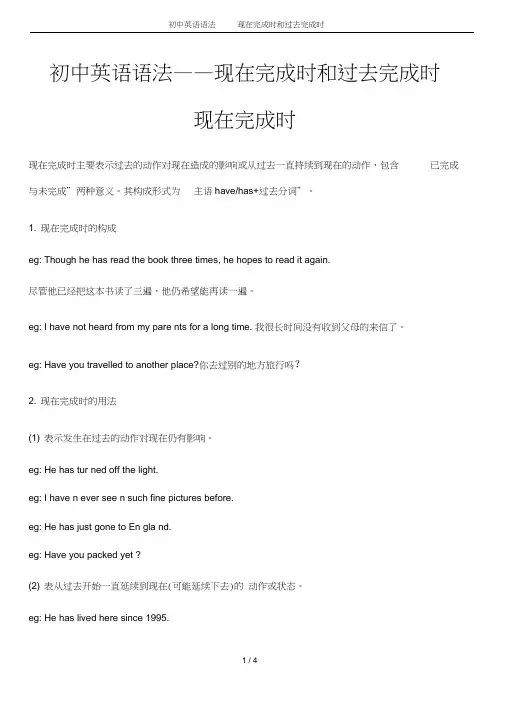
初中英语语法——现在完成时和过去完成时现在完成时现在完成时主要表示过去的动作对现在造成的影响或从过去一直持续到现在的动作,包含已完成与未完成”两种意义。
其构成形式为主语have/has+过去分词”。
1. 现在完成时的构成eg: Though he has read the book three times, he hopes to read it again.尽管他已经把这本书读了三遍,他仍希望能再读一遍。
eg: I have not heard from my pare nts for a long time. 我很长时间没有收到父母的来信了。
eg: Have you travelled to another place?你去过别的地方旅行吗?2. 现在完成时的用法(1) 表示发生在过去的动作对现在仍有影响。
eg: He has tur ned off the light.eg: I have n ever see n such fine pictures before.eg: He has just gone to En gla nd.eg: Have you packed yet ?(2) 表从过去开始一直延续到现在(可能延续下去)的动作或状态。
eg: He has lived here since 1995.eg: I have been away from my hometown for thirty years. 我离开家乡有30 年了。
eg: Un cle Wang has worked in the factory since it ope ned.自从该工厂成立以来,王叔叔就一直在这里工作。
eg: 1 have lived in Bejing since I came to China.自从我来至U中国就一直住在北京。
(3) have gone to和have been to的区另have gone to表示去而未归” have been to表示去已归来”。
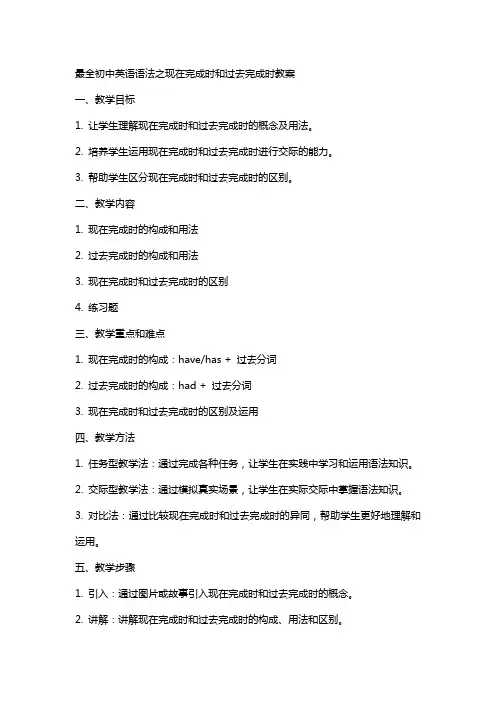
最全初中英语语法之现在完成时和过去完成时教案一、教学目标1. 让学生理解现在完成时和过去完成时的概念及用法。
2. 培养学生运用现在完成时和过去完成时进行交际的能力。
3. 帮助学生区分现在完成时和过去完成时的区别。
二、教学内容1. 现在完成时的构成和用法2. 过去完成时的构成和用法3. 现在完成时和过去完成时的区别4. 练习题三、教学重点和难点1. 现在完成时的构成:have/has + 过去分词2. 过去完成时的构成:had + 过去分词3. 现在完成时和过去完成时的区别及运用四、教学方法1. 任务型教学法:通过完成各种任务,让学生在实践中学习和运用语法知识。
2. 交际型教学法:通过模拟真实场景,让学生在实际交际中掌握语法知识。
3. 对比法:通过比较现在完成时和过去完成时的异同,帮助学生更好地理解和运用。
五、教学步骤1. 引入:通过图片或故事引入现在完成时和过去完成时的概念。
2. 讲解:讲解现在完成时和过去完成时的构成、用法和区别。
3. 练习:让学生完成一些练习题,巩固所学知识。
4. 交际:模拟真实场景,让学生运用现在完成时和过去完成时进行交际。
6. 作业:布置一些课后作业,让学生进一步巩固所学知识。
六、教学活动1. 小组讨论:让学生分组讨论现在完成时和过去完成时在日常对话中的应用场景。
2. 角色扮演:学生分组进行角色扮演,模拟不同场景下使用现在完成时和过去完成时的对话。
3. 游戏:设计一个语法接龙游戏,要求学生使用现在完成时和过去完成时进行接龙。
七、课堂反馈1. 问答环节:教师提问,学生回答,检查学生对现在完成时和过去完成时的掌握程度。
2. 练习点评:教师对学生的练习进行点评,指出错误并给予正确指导。
3. 学生互评:让学生互相评价对方的口语表达,共同提高。
八、拓展活动1. 语法卡片制作:学生分组制作现在完成时和过去完成时的语法卡片,包括用法、例句等。
2. 语法展示:各组展示自己制作的语法卡片,并简要介绍卡片内容。
现在完成时与过去完成时一、现在完成时过去发生并且已经完成的动作对现在造成影响或后果,过去某一时间开始并一直持续到现在的动作或状态。
1.构成现在完成时是由助动词have(has)+动词的过去分词构成。
助动词说明该谓语是属于现在时范围。
它和主语的人称、数要保持一致。
过去分词是主要的谓语动词,说明句子的意义。
2.用法(1)表示动作发生在过去某个不确定的时间,但对现在留下了某种影响和结果。
常被just、already、yet 等副词修饰。
如:-Have you had lunch yet? -Yes,I have. I've just had it. 你(已经)吃午饭了吗?我刚刚吃过。
(现在我不饿了)(2)表示从过去某一时刻开始一直持续到现在的动作或状态。
这个动作可能刚停止,可能仍然在进行。
常带有for和since等表示一段时间的状语。
如:He has taught here since 1981. 他自1981年就在这儿教书。
(可能还要继续教)I haven't seen her for four years. 我有四年没见到她了。
(3)表示说话前发生过一次或多次的动作,现在成为一种经验,一般译为汉语“过”,常带有twice, ever, never, three times等时间状语。
如:I have been to Beijing twice.我去过北京二次。
3.结构1).陈述句结构:主语+have( has)(not)+过去分词+其它。
have not=haven’t has not=hasn’t.2).一般疑问句结构:Have( Has )+主语+过去分词+其它?3).特殊疑问句:特殊疑问词+have(has) +主语+ 过去分词+其它?eg. He has already finished his homework.He hasn’t finished his homework yet.Has he finished his homework yet?--Yes, he has./ No, he hasn’t./ No, not yet.4.现在完成时的时间状语(1)现在完成时属于现在时范围,故不能和过去的时间状语连用。
初中英语语法——现在完成时和过去完成时现在完成时现在完成时主要表示过去的动作对现在造成的影响或从过去一直持续到现在的动作,包含“已完成”与“未完成”两种意义。
其构成形式为“主语have/has+过去分词”。
1.现在完成时的构成eg: Though he has read the book three times, he hopes to read it again.尽管他已经把这本书读了三遍,他仍希望能再读一遍。
eg: I have not heard from my parents for a long time. 我很长时间没有收到父母的来信了。
eg: Have you travelled to another place? 你去过别的地方旅行吗?2.现在完成时的用法(1)表示发生在过去的动作对现在仍有影响。
eg: He has turned off the light.eg: I have never seen such fine pictures before.eg: He has just gone to England.eg: Have you packed yet ?(2)表从过去开始一直延续到现在(可能延续下去)的动作或状态。
eg: He has lived here since 1995.eg: I have been away from my hometown for thirty years. 我离开家乡有30年了。
eg: Uncle Wang has worked in the factory since it opened.自从该工厂成立以来,王叔叔就一直在这里工作。
eg: 1 have lived in Bejing since I came to China. 自从我来到中国就一直住在北京。
(3) have gone to 和have been to 的区别have gone to 表示“去而未归”; have been to 表示“去已归来”。
初中语法——现在完成时和过去完成时专题 -CAL-FENGHAI-(2020YEAR-YICAI)_JINGBIAN现在完成时和过去完成时(1)现在完成时:1.概念:过去发生或已经完成的动作对现在造成的影响或结果,或从过去已经开始,持续到现在的动作或状态。
2.时间状语:(时间标志词)these days,recently, lately,in/during the past few years, already ,yet ,never ,ever, just, before, in the past (last) few days,so far ,once, twice ,for+时间段,since+过去的时间点,since+—般过去时的从句等。
3.基本结构:have/has + done4.否定形式:have/has + not +done.5.一般疑问句:把have或has放于句首。
6.反义疑问句:直接用has /have 进行反问7.现在完成时的用法:①表示过去发生或已经完成的动作对现在造成的影响或产生的结果。
如:—Have you had your lunch yet你吃过午饭了吗—Yes,I have.I've just had it.是的,我刚吃过。
(现在不饿了)I have closed the door. (门现在是关的)②表示从过去开始一直持续到现在的动作或状态,可能还要持续下去,常与for或since连用。
表示持续的动作或状态多为延续性动词。
如:He has lived here since l999.自从1999年以来,他就住在这儿。
I have learnt English for ten years.我学习英语有10年了。
We have lived here for two years. (过去住到现在)8. 难点:(1)现在完成时可和疑问词where, why, how 连用,但不能和when连用.故现在完成时对时间的提问不用when,只用how long。
初中英语语法八大时态1.结构肯定句式: 主语+动词原形/动词的第三人称单数+其他否定句式: 主语+(助动词)don't/doesn't +动词原形+其他一般疑问句式: Do/Does+主语+动词原形+其他简略回答: (肯)Yes,主语+do/does (否)No,主语+do/does not缩写形式: don't = do not doesn't = does not例句:He often goes swimming in summer.I usually leave home for school at 7 every morning.2.用法1)表示经常的、习惯性的动作或存在的状态,常与表示频度的副词连用。
常用的频度副词有:always、often、usually、seldom、never、sometimes, every week (day, year, month…), once a week, on Sundays.频度副词在句中通常放在行为动词之前,系动词、助动词之后。
例如: He often goes swimming in summer.I usually leave home for school at 7 every morning.2)表示主语具备的性格、特征和能力等。
例如:All my family love football .My sister is always ready to help others .Ann writes good English but does not speak well.3)表示客观真理、客观存在、自然现象。
例如:The earth moves around the sun.Shanghai lies in the east of China.4)表示按计划或安排好的,或将要发生的动作,可用一般现在时表将来。
语法—-——现在完成时和过去完成时的区别1.从结构上区别现在完成时:主语 + have / has + 过去分词(肯定式)主语 + have / has + not + 过去分词 (否定式)Have / Has + 主语 + 过去分词(疑问式)过去完成时:主语 + had + 过去分词(肯定式)主语 +had + not + 过去分词(否定式)Had + 主语 + 过去分词(疑问式)2。
从时间状语区别现在完成时:常用的时间状语包括“now, today, tonight, this week, this year, already, yet, just, recently…etc”。
过去完成时:常用的时间状语包括“by, at, before等构成的短语"。
注意:当表示一段时间,现在完成时和过去完成时都可以用for 或since引导的状语.例如:Have you had your lunch yet?你吃午饭了吗?Yes, I have . I've just had it。
是的,我刚吃完.I have had a clock now。
我现在有一个闹钟了。
Have you already posted the photos? 你把照片寄走了吗?The meeting had begun when we got there。
我们到那儿时,会议已经开始了。
We had learned about 5000English words by the end of last term。
到上学期末我们已经学了5000个英语单词。
They had done the work at five o’clock. 在五点钟的时候他们已经完成了那项工作。
I’ve known Li Lei for three years。
我认识李蕾已经三年了。
I have worked here since ten years ago。
初中语法——现在完成时和过去完成时专题现在完成时和过去完成时(1)现在完成时:1.概念:过去发生或已经完成的动作对现在造成的影响或结果,或从过去已经开始,持续到现在的动作或状态。
2.时间状语:(时间标志词)these days,recently, lately,in/during the past few years, already ,yet ,never ,ever, just, before, in the past (last) few days,so far ,once, twice ,for+时间段,since+过去的时间点,since+—般过去时的从句等。
3.基本结构:have/has + done4.否定形式:have/has + not +done.5.一般疑问句:把have或has放于句首。
6.反义疑问句:直接用has /have 进行反问7.现在完成时的用法:①表示过去发生或已经完成的动作对现在造成的影响或产生的结果。
如:—Have you had your lunch yet?你吃过午饭了吗?—Yes,I have.I've just had it.是的,我刚吃过。
(现在不饿了)I have closed the door. (门现在是关的)②表示从过去开始一直持续到现在的动作或状态,可能还要持续下去,常与for或since连用。
表示持续的动作或状态多为延续性动词。
如:He has lived here since l999.自从1999年以来,他就住在这儿。
I have learnt English for ten years.我学习英语有10年了。
We have lived here for two years. (过去住到现在)8. 难点:(1)现在完成时可和疑问词where, why, how 连用,但不能和when连用.故现在完成时对时间的提问不用when,只用how long。
现在完成时和过去完成时(1)现在完成时:1.概念:过去发生或已经完成的动作对现在造成的影响或结果,或从过去已经开始,持续到现在的动作或状态。
2.时间状语:(时间标志词)these days,recently, lately,in/during the past few years, already ,yet ,never ,ever, just, before, in the past (last) few days,so far ,once, twice ,for+时间段,since+过去的时间点,since+—般过去时的从句等。
3.基本结构:have/has + done4.否定形式:have/has + not +done.5.一般疑问句:把have 或has 放于句首。
6.反义疑问句:直接用has /have 进行反问7.现在完成时的用法:①表示过去发生或已经完成的动作对现在造成的影响或产生的结果。
如:—Have you had your lunch yet?你吃过午饭了吗?—Yes,I have.I've just had it.是的,我刚吃过。
(现在不饿了)I have closed the door. (门现在是关的)②表示从过去开始一直持续到现在的动作或状态,可能还要持续下去,常与for 或since 连用。
表示持续的动作或状态多为延续性动词。
如:He has lived here since l999.自从1999 年以来,他就住在这儿。
I have learnt English for ten years.我学习英语有10 年了。
We have lived here for two years. (过去住到现在)8. 难点:(1)现在完成时可和疑问词where, why, how 连用,但不能和when 连用.故现在完成时对时间的提问不用when,只用how long。
Where have you been? Why have you turned off the radio? When have you come back? (×)He has been in China for 4 years. (提问) When(×) / How long(✓) has he been in China?(2)have been to /have gone to /have been in 的区别have been to +地点表示曾经去过某地,现人已返回。
(once ,twice ….)have gone to +地点表示人已去了某地,人还未返回。
(where is sb ?)have been in +地点表示在某地呆多长时间。
(for…../ since …..)I have been to Beijing twice.–Where is Tom? –He has gone to HK.Lucy has been in this school for two years.(3)短暂性动词和持续性动词的现在完成时A.若后面没有时间状语“for + 时间段,since +时间点”时,短暂性和持续性动词都可用于现在完成时。
如:I have bought(短暂) a new computer. (✓)He has already lived (持续) in the small village. (✓)B.若后面有时间状语“for + 时间段,since + 时间点”时,要用持续性动词或短暂性动词的否定。
如:They have stayed (持续) in the village for 10 years.I have taught(持续) English at this school since 5 years ago.You haven’t received (短暂)her letter for 2 weeks.We haven’t left (短暂)China since 20 years ago.注意:非延续性动词的否定形式可以与表示延续时间的状语连用。
即动作不发生的状态是可以持续的。
(错)I have received his letter for a month. (对)I haven't received his letter for almost a month.C.短暂性动词的肯定不能与“for + 时间段,since + 时间点”连用,若要和他们连用则要将短暂性动词变为相对应的动词。
如:I have come here for 3 years. (×)→I have been here for 3 years.( ✓)现举例说明这类动词的变化:下划线的词是错的,括号里的词是对的,borrow / lend→ kept She has borrowed(kept) the magazine since two weeks ago.catch→ had Kate has caught (had) a cold for one day.buy→ had I’ve bought (had) this radio for 3 years.put on → worn He has put on (worn) the new coat for a week.leave / go→been away They have left(been away) for one year.start / begin→ been on The film has begun (been on) for 8 minutes.get up→ been up He has gone up(been up) more than two hours.move→ been out (of) Jim’s family have moved(been out of) here for over 2 years.finish→ been over The football match has finished(been over) for two hours.open→ been open The factory has opened(been open) since 1990.close→ been closed The factory has closed (been closed) for 2 months.die→ been dead That old man has died(been dead) for three years.j oin→ been in/ been a member (of) Her father has joined (been in) the Party for ten years.come/ become/ arrive→been(in)They have come to(been in) this school since 1990.注意:非延续性(短暂性)动词的肯定不能与表示一段时间的状语连用。
必须把非延续性动词改为相应的表示延续性的动词或短语,这时可与表示一段时间的状语连用。
常见的非延续性动词通常作如下变换:come/go to → be at /in ,leave→be away from,buy→have,borrow/lend→keep,die→be dead,start/begin→be on,close→be closed,open→be open,join→be in/be a member of/be a soldier. ... ,go/come there→be there,get married→be married,get up ---be up,catch a cold→have a cold,return→be back,fall ill→be ill,become→be,has gone to→has been in,die---dead ,make friend -- be friendfall asleep ---be asleep ,catch a cold – have a cold,reach/get/arrive---stay/be 等。
误:l have bought this computer for two years. 正:I have had this computer for two years.这台电脑我买了有两年了。
(4)与现在完成时有关的四种句型之间的转换。
现在完成时的四种句型:A).主语+短暂性动词的过去式+ 时间+agoB).主语+have/has +延续性动词的过去分词+for…./since …. ago.C).It’s +时间段+si nce +短暂性动词的过去式D).时间段+has passed +since +短暂性动词的过去式如:“我来广东有 4 年了”可用以下句型表示:I came to Guangdong 4 years ago. →I have been in Guangdong for 4 years.It’s 4 years since I came to Guangdong →Four years has passed since I came to Guangdong.His grandfather died two years ago. His grandfather has for two years.two years his grandfather .Two years his grandfather .(5)现在完成时与一般过去时的区别①. 标志词不同(具体看两种时态标志词) 如:I went to cinema two days ago. (一般过去时标志词).He has been away since ten days ago. (现在完成时的标志词)②. 一般过去时表示动作发生在过去,与现在无关。
而现在完成时表示动作发生在过去,对现在造成影响。
I saw the film yesterday. (我昨天看了这部电影)(强调看的动作发生过了)I have seen the film before.(过去看过电影,强调对现在的影响,电影的内容已经知道了,不想再看了)I won’t see it again.Has he returned the library book? Yes, he has.When he (return) it ?He (return)it yesterday afternoon .※句子中如有过去时的时间副词(如yesterday, last, week, in 1960)时,不能使用现在完成时,要用过去时。